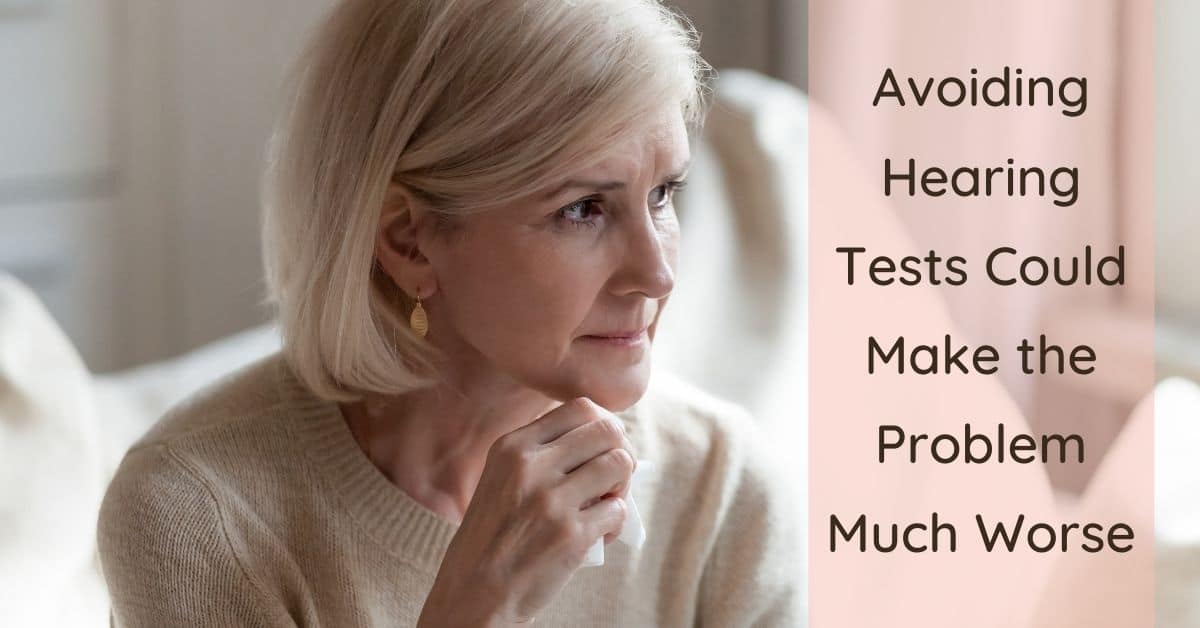Once upon a time, hearing loss was thought to be an annoying and frustrating part of getting older, but relatively benign. In recent decades, however, we’ve learned that hearing loss is implicated in a problematic cascade of negative health effects, and can even be a warning sign of an underlying cardiovascular problem.
Unfortunately, hearing loss is underdiagnosed and undertreated. The Better Hearing Institute, a non-profit organization dedicated to improving health outcomes for those with hearing loss, recommends getting a hearing test once every decade until age 50, and every three years after that. Most people don’t adhere to this schedule, and as a consequence most of us don’t realize that we’re developing hearing loss until it becomes a problem in our daily lives.
What’s more, people wait an average of seven years from the time they notice hearing loss to the time they seek treatment for it. A lot can happen in seven years, and missing out on an earlier diagnosis means that lifestyle adjustments which could prevent further hearing loss are never prescribed.
Dietary Adjustments Can Prevent Hearing Loss
Recent research from the Brigham and Women’s Hospital discovered that those who closely follow an anti-inflammatory diet, such as the Alternate Mediterranean diet (AMED) or Dietary Approaches to Stop Hypertension (DASH), are at a significantly reduced risk for age-related hearing loss. Most of the participants in the study were around age 60, and significant hearing loss was measured in many over the course of just three years, at an age when most people are not thinking about hearing loss yet.
Early Diagnosis Can Prevent Further Hearing Loss
It’s not just age-related hearing loss, but also noise-induced hearing loss (NIHL) that goes undiagnosed. Many of us may work in noisy environments or be exposed to chemicals that can engender hearing loss, and skipping out on hearing tests means that we won’t notice until the hearing loss has become much worse than it needed to. An earlier diagnosis of hearing loss means we can avoid contact with ototoxic chemicals, avoid loud environments, or wear hearing protection.
You see, hearing loss doesn’t work like near-sightedness. When we need glasses, we notice that the world is blurry, that we’re squinting all the time, and we get headaches. With hearing loss, our hearing doesn’t get “blurry,” per se, but we simply can’t hear as much as we once did. Our brain is constantly adjusting to the amount of sound it receives from the ears, so unless we lose our hearing very quickly from some catastrophic sonic event or a life-saving medical intervention, we’re unlikely to realize that it’s getting worse until we start having trouble in conversation.
Early diagnosis of hearing loss allows us to protect ourselves from the causes we might identify, whether they be noise-related, dietary or medicinal. Age-related hearing loss that happens more quickly than normal can also be indicative of a cardiovascular issue, so in this case catching hearing loss early could even help us avoid a life-threatening health risk.
Hearing Tests Explained
Hearing tests are easy and painless. An appointment begins with a brief conversation with an audiologist or hearing healthcare professional, where they will inquire about your personal and family health history. They’ll ask about your lifestyle and whether you’re having any trouble with your hearing from day to day.
The test itself involves wearing a set of headphones in a soundproof room while the person administering the test plays tones or speech and asks you questions about what you’re hearing. Afterward, they’ll show you an audiogram which plots your personal hearing ability alongside what is considered “normal.” If you have hearing loss, they’ll tell you where in the audible frequency spectrum you’re deficient and what course of action is recommended for you.
Hearing Aids Can Help
If you could benefit from hearing aids, it’s important to start wearing them sooner than later. As hearing loss progresses, changes in the brain can actually make us lose the ability to interpret speech, even if we hear it clearly, so it’s important to stay on top of our hearing health and make sure we’re treating our hearing loss.
Those who wear hearing aids overwhelmingly, by as much as 91%, say they’re satisfied with them, and research indicates that hearing aids not only keep our brains sharper for longer, but also lead to generally better moods and even a more optimistic outlook on life. So don’t fear the hearing test; you’ve got nothing to lose and everything to gain! Contact us today to schedule an appointment for a consultation.

